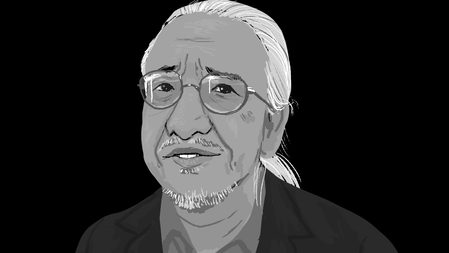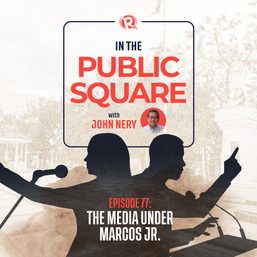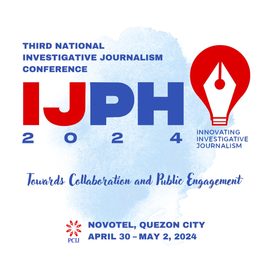SUMMARY
This is AI generated summarization, which may have errors. For context, always refer to the full article.
![[Newsstand] Conrad de Quiros, rock star](https://www.rappler.com/tachyon/2023/11/20231111-conrad-de-quiros-rockstar.jpg)
When my students at the University of the Philippines hosted Conrad de Quiros at a forum they organized for my opinion writing class, back in 2009, they prepared an unusual reception for him. Instead of the usual set-up, with the speaker in front of the auditorium at the lectern and the audience seated in the usual rectangle of neat rows, my class covered the entire front part of the College of Mass Communications auditorium in handwoven mats and then spread throw pillows all over the place. In the middle of that large, improvised, banig circle was a lone chair, reserved for Conrad. It was a sit-in, the perfect setting for a forum my students titled “Jamming with Conrad.”
I was not prepared for it (my students do all the work in the forums; my only role is to invite the speakers), but when I walked into the auditorium I immediately realized it was an inspired idea. We all ended up literally sitting at his feet, while he took questions and gave calm, calming answers.
Some of his answers were deeply provocative, because Conrad was a provocative thinker. But in person, Conrad was a gentle, thoughtful presence. My students in 2009 must have come up with the concept for the forum because they saw Conrad as a guru to listen to, someone to jam with: long hair, crisp English, with an earned reputation for both hard drinking and fearless writing. And to borrow the rhythm of his own prose for a moment, Conrad did not only look the part, he did not only act the part, he WAS the part.
One more thing. It could only have been Conrad. No other columnist, however beloved or influential, could have inspired the idea of the banig sit-in. My classes in UP, where I taught from 2008 to 2012, hosted other renowned columnists, who honored us with their time and shared their insights on the shaping of opinion. I mean no disrespect to them when I say that Conrad was treated with awe; there were no screaming fans when the forum finally pushed through (a storm had caused a postponement from late September to early October), but in every other regard he was the columnist as rock star.
Nature of influence
In the post-Marcos or EDSA era, three columnists have a good claim to be the most consequential. They all had the power to set the agenda, but differences in agenda revealed differences in the nature of influence.
Max Soliven enjoyed access to the men and women whose hands were on the different levers of power, regardless of administration. Out of this privilege, he wrote kilometric pieces of polished policy-moving prose almost every day.
Perhaps no one in the history of Philippine journalism can equal the phrasemaking of Louie Beltran, who taught the political classes the distinction between insulares and peninsulares, proved the existence of We Bulong brigades, and classified the traditional politician as a species of balimbing.
Conrad de Quiros belonged to this uppermost level of influence – but unlike Soliven and Beltran, his power did not lie in his appeal to the political class. To be sure, public officials and government bureaucrats and political operators also read him, but he was one of the most consequential writers of his time because he appealed (to coin a term) to the reading class: the news consumers, the budding writers, the young activists working in journalism and civil society and public service, many of whom (to judge by the outpouring of grief and gratitude on social media after his death was announced) must have wanted to be like him.
Other columnists had influence, of course. Among them, Teddy Benigno with his hard-bitten reflections, Amando Doronila with his perceptive news analyses. Other columnists were as popular, or even more popular, than Conrad. I remember the publisher Betty Go-Belmonte speak matter-of-factly about how many more copies the Star sold when Ricky Lo’s show business column came out. And Ambeth Ocampo remains a bestselling phenomenon.
But Soliven influenced policy to perhaps the greatest extent, and Beltran made a lasting impact on culture by teaching us how to describe our colorful politics. Conrad’s influence was, I would argue, mostly on the personal level. He inspired two generations of readers who did not have much power, but felt strongly about the issues of the day and the fate of their perpetually struggling country.
I’ve read many social media posts in the wake of Conrad’s passing praising the elegance of his writing. I agree that there was a music to his prose, but I see power, rather than grace, as his defining quality. He wrote powerfully; he wrote in waves, adding the rhythm of his periods to his arguments; he wrote for impact.
He was the writer as columnist, earning his large and loyal audience reader by reader through sheer skill in writing. That was the source and sum of his lasting appeal: Not necessarily connections, not necessarily up-to-dateness, but the seductiveness of a writing style—a style that, more often than not, called it right.
Mastery of rhetoric
He was a master of repetition. Here, for instance, is Conrad writing about Rizal.
“For that was what Rizal was. He wasn’t just a glimmer in the dark pit of colonial rule, he was a veritable torchlight. He wasn’t just an intelligent indio amid a mass of bovine fools groping in the dark, he was an absolute renaissance man.” The anaphora in the second and third sentences—“He wasn’t just … he was/He wasn’t just … he was” was his stock in trade; this was often the way he generated those compelling waves that surged through his prose. And the transformation of “glimmer” into “torchlight” and “indio” into “renaissance man” is subtle expolitio, or parallel restatement.
He was also a master of definition. In a column in which he debunked the idea of the wasted vote, he defended the practice of voting for someone “who seems to have little chance of becoming senator or congressman or mayor.” In other words, voting for someone you think is best qualified, not necessarily the one you think most likely to win. He asks: “What is the wise vote? It is the vote you give that is true to the vote.”
In another column on ordinary heroes, he focuses on the simple but inspiring feat of a 12-year-old girl saving the Philippine flag from a flood or the promise of a 21-year-old nurse to stay and work in the country instead of plying his new trade abroad. “What is heroism?,” Conrad asks. “It is doing the right thing despite the alternative being perfectly understandable.”
He was, not least, a master of argument. In the end, the power of his prose depended not so much on rhetorical mastery but on clear and closely reasoned thinking. In his column on the wasted vote, for instance, he stands conventional wisdom on its cynical head:
”To begin with, the equation in elections is simple: You vote for a candidate, he wins; you do not vote for a candidate, he loses. At the end of the day, surveys are not counted, votes are. Arguably, surveys do contain a grain of truth in them, but only a grain. There is no finality to it, there is no inevitability to it. The respondents can always change their minds. You can always change your mind. You can always change the world. The longest journey begins with the first step. The most impossible victory begins with the first vote.”
Generosity of spirit
It was a thrill for me to become a colleague of Conrad’s. For seven years, from when I first started writing a column in 2007, up to 2014, when his writing hand was stilled by a stroke, we breathed the same air in the Inquirer’s opinion pages. I had been a fan and faithful reader of his for many years, but he treated me like an equal. He was unfailingly generous to me, even when I found myself (and this happened a few times) criticizing a position of his in print. He quickly accepted my invitation to the class forum, and he just as readily agreed to speak at the launch of my first book. In print, he was fearless; in person, he was just one of the guys. No airs, no sense of entitlement at all.
About a decade ago, I ran into my first-year high school English teacher, the eminent Onofre Pagsanghan, or Mr. Pagsi, in one event. He received me with a clever and unforgettable greeting: “How is my second favorite columnist?” he asked. We both laughed. I said I was well, and flattered that he read me. Then I asked him, “But who is your favorite, Sir?” (To this day, almost 50 years since he taught us, my classmates and I still think of Mr. Pagsi as “Sir.”)
I was not able to record his answer, but I cannot forget his words: “Conrad, of course. I have been reading him for a long time. He will always be my favorite writer.” – Rappler.com
Veteran journalist John Nery is a Rappler columnist, editorial consultant, and program host. “In the Public Square” airs on Rappler social media platforms every Wednesday at 8 pm.
1 comment
How does this make you feel?










![[OPINION] You don’t always need a journalism degree to be a journalist](https://www.rappler.com/tachyon/2024/06/jed-harme-fellowship-essay-june-19-2024.jpg?resize=257%2C257&crop=287px%2C0px%2C720px%2C720px)





Thanks to Sir John Nery for his inspiring article, “Conrad de Quiros, rock star.” His writing about Conrad de Quiros establishes a relationship between his reader and that of the latter. How he describes Mr. Quiros and narrates his personal experiences with the latter – allows the reader to indirectly relate with Mr. Quiros in a very inspiring manner. This is up to the point that the reader would wish to have personally met Mr. Quiros himself.